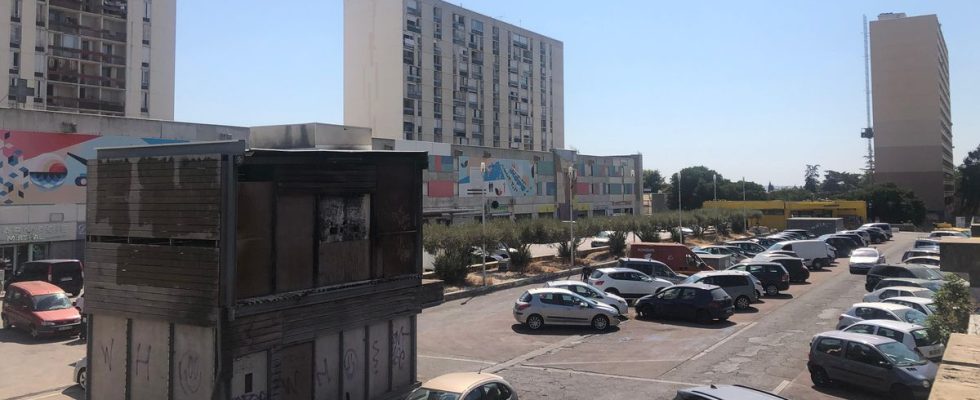“We will end up being completely excluded from the city!” » This resident of Pissevin is not angry. Since the death of a 10-year-old child, the collateral victim of a shooting, on August 21, in this district of Nîmes (Gard) plagued by score-settling, public services have been melting away visibly. In nurseries and leisure centers, the town hall, which had already closed the media library before the summer, has decided to reduce the opening hours for children. The city has postponed waste collection from 5 a.m. to 8 a.m.
And if the recovery at a minimum this Wednesday of the bus service, suspended for several weeks by the city, satisfied the residents, they find it difficult to understand that we can leave a neighborhood abandoned.
“We create ghettos and we don’t take care of them”
“What a hassle, without a bus!”, this resident exclaims. Why are we, in Pissevin, treated like this, when other areas of the city have experienced so much violence, and have never been deprived of transport? » For this lady, it has been “twenty years” since residents were “abandoned” by public services. “It’s nothing new,” she sighs. It has never been renovated. Nothing is done. It’s a shame. We create ghettos, we gather people together, and we don’t take care of them. » For public services to leave Pissevin is not the right solution, she regrets. To justify their disengagement, the communities point to the safety of their agents, in a neighborhood plagued by drug trafficking. “Why would they be more afraid here than at Chemin Bas d’Avignon? », another sensitive district of Nîmes, she wonders.
Reducing public services, “an additional difficulty for residents”
“Reducing, with each dramatic event, public services in the neighborhood is an additional difficulty for residents,” in an area where the promised urban renovation is already long overdue, deplores Raouf Azzouz, the director of the social center. Les Mille Couleurs, which has been trying for twenty-five years to bring the inhabitants of Pissevin into dialogue. “Nurseries, trash cans, culture, doctors… We wonder,” continues this association leader. The longer things go, the more this territory deteriorates, unfortunately. »
Alain Lorgeas knows this neighborhood like the back of his hand. This 83-year-old former paratrooper non-commissioned officer, president of the neighborhood committee, has lived in Pissevin since 1972. And he is dismayed to see how public services are being undermined. ” The mayor [Jean-Paul Fournier, LR] has given up on so-called sensitive neighborhoods, contrary to what he says, he confides. Of course, he protects his agents. But we must not forget that there are more than 15,000 inhabitants in Pissevin! Instead of resisting the pressure, we pull down our pants. »
“Going back is not a good solution”, for Vincent Bouget (PCF)
Vincent Bouget (PCF), departmental secretary of the PCF and municipal and community advisor, also understands that the city protects its employees. “But, on the other hand, going backwards is not a good solution,” confides the elected official. Since Fayed’s death [le petit garçon tué le 21 août], the situation of the inhabitants of Pissevin has deteriorated, although we could have hoped that it would improve. We could expect the mayor of Nîmes to bring the city, the other local authorities, the State, the associations around the table… To say “Now, let’s go, and we’ll all go together”. »
The city and agglomeration of Nîmes did not respond to requests from 20 minutes. In their press releases published since the end of August about the Pissevin district, these communities highlight their wish not to expose their agents to violence. “In a context where serious security problems persist in the Pissevin district, I have been kept informed of the daily difficulties surrounding municipal services,” indicated the mayor, Jean-Paul Fournier, on September 29, in a press release detailing the adjustment of public service schedules in the sector. “No improvement in the security situation in the neighborhood is expected in the short term (…) Absolute priority must be given to the safety of people, children, their families and the staff who work in this neighborhood. »
Ten days earlier, on September 19, Nîmes Métropole, which had suspended transport services to the Pissevin district, said it heard users’ requests to resume service as quickly as possible. But the community also said it understood “the anxiety of the drivers to work in the conditions and circumstances which have dramatically marked the neighborhoods”. But the city and agglomeration of Nîmes are also waiting, they have indicated in recent weeks, for the State to take its responsibilities in the fight against drug trafficking and the settling of scores in Pissevin.

